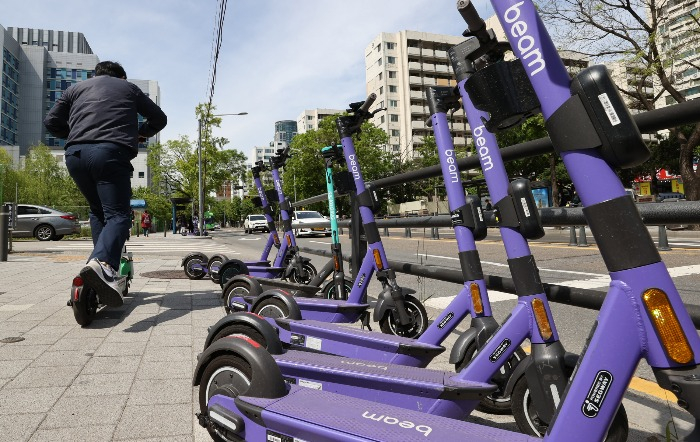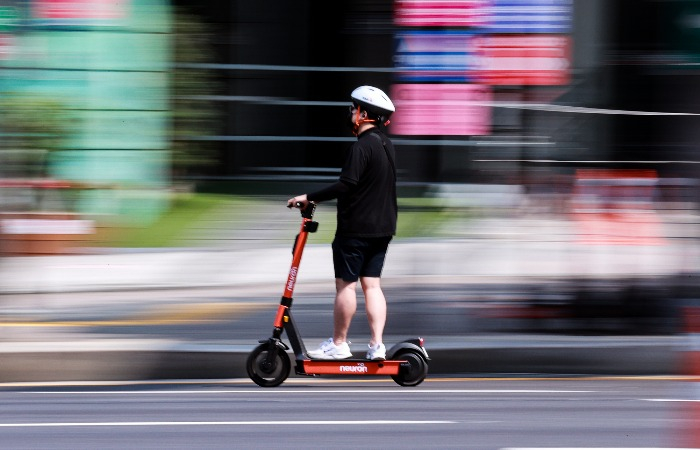Future mobility
Korean e-scooter platforms diversify to survive
Korean e-scooter operators are fighting to survive as their foreign rivals halt services or pull out
By Aug 16, 2022 (Gmt+09:00)
2
Min read
Most Read
LG Chem to sell water filter business to Glenwood PE for $692 million


Kyobo Life poised to buy Japan’s SBI Group-owned savings bank


KT&G eyes overseas M&A after rejecting activist fund's offer


StockX in merger talks with Naver’s online reseller Kream


Mirae Asset to be named Korea Post’s core real estate fund operator



South Korean shared electric scooter platforms are taking over their smaller rivals or entering new markets as beefed-up safety guidelines on two-wheelers contribute to a sharp decline in scooter users.
Meanwhile, their foreign rivals, including the US-based Lime, have temporarily halted services in Korea or pulled out altogether. A number of scooter accidents, which claimed about a dozen lives last year, has slashed demand for e-scooters.
Gbike, the operator of the country's largest shared scooter app Gcooter, on Monday announced its acquisition of GUGU Kickboard, which operates in Seongnam, Gyeonggi Province, some 20 km southeast of Seoul.
The acquisition followed Gbike’s purchase of a shared last-mile mobility platform ZET from Hyundai Motor Co. last month. ZET allows its customers to use e-scooters or e-bikes from a subway or bus station to their destination.
Under revised traffic laws that came into force in May 2021, e-scooter riders must obtain a relevant driver’s license and wear helmets. They are also banned from riding on sidewalks. If no cycling lane exists, they must ride on the road.
Since the introduction of the tightened requirements, the number of shared e-scooter users has tumbled by half.

“Toughened regulations pushed marginal companies to the brink," said Kim Hyung-san, CEO of Korean scooter app SWING. “The industry is now picking out the gems among the pebbles.”
ENTRY INTO NEW TERRITORY
Some e-scooter platforms are diversifying into other business areas. Early this month, Korea-based Deer announced its entry into the freight transport market by providing relevant software as a service. The three-year-old startup will roll out its logistics automation system Carry at the end of this year.
Kickgoing, the pioneer in the country’s shared e-scooter market, last month added electric bikes to its portfolio, allowing its users to choose from e-scooters and e-bikes.
To do so, it received 4 billion won ($3 million) worth of bicycles as an investment from Samchuly Bicycle Co., Korea’s largest bicycle supplier.
Its rival SWING made its foray into less-regulated Japan last month. It plans to secure 1,500 scooters by the end of this month to launch service in the Tokyo region.
Write to Eun-Yi Ko at koko@hankyung.com
Yeonhee Kim edited this article
More to Read
-
 Business & PoliticsTrump Jr. meets Korean business chiefs in back-to-back sessions
Business & PoliticsTrump Jr. meets Korean business chiefs in back-to-back sessionsApr 30, 2025 (Gmt+09:00)
-
 Korean chipmakersSamsung in talks to supply customized HBM4 to Nvidia, Broadcom, Google
Korean chipmakersSamsung in talks to supply customized HBM4 to Nvidia, Broadcom, GoogleApr 30, 2025 (Gmt+09:00)
-
 EnergyLS Cable breaks ground on $681 mn underwater cable plant in Chesapeake
EnergyLS Cable breaks ground on $681 mn underwater cable plant in ChesapeakeApr 29, 2025 (Gmt+09:00)
-
 Business & PoliticsUS tariffs add risk premium to dollar assets: Maurice Obstfeld
Business & PoliticsUS tariffs add risk premium to dollar assets: Maurice ObstfeldApr 29, 2025 (Gmt+09:00)
-

Comment 0
LOG IN


